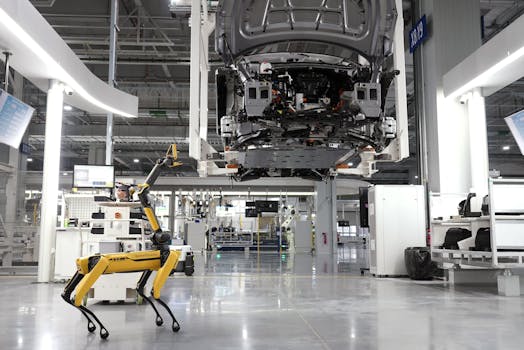
Technological Innovations Shaping 2025: A New Era of Possibilities
Technological innovations are transforming the world at an unprecedented rate, and 2025 is poised to be a landmark year for emerging trends and groundbreaking technologies. As we step into this new era, it’s essential to understand the impact of these innovations on various industries and aspects of our lives. In this article, we’ll delve into the most significant technological innovations shaping 2025 and explore their potential to revolutionize the way we live, work, and interact.
Artificial Intelligence (AI) and Machine Learning (ML)

Artificial intelligence and machine learning are no longer mere buzzwords; they’ve become an integral part of our daily lives. From virtual assistants like Siri and Alexa to self-driving cars, AI and ML are transforming industries and revolutionizing the way we interact with technology. In 2025, we can expect to see even more sophisticated AI-powered systems that can learn, adapt, and make decisions autonomously.
Cybersecurity: The Next Frontier

As technology advances, cybersecurity threats are becoming increasingly sophisticated. In 2025, cybersecurity will be a top priority for individuals, businesses, and governments alike. We can expect to see significant investments in cybersecurity research and development, leading to the creation of more robust and resilient security systems. From AI-powered threat detection to quantum encryption, the next generation of cybersecurity solutions will be designed to stay one step ahead of hackers and cyber threats.
Internet of Things (IoT) and Smart Cities

The Internet of Things (IoT) is transforming the way we live and interact with our surroundings. In 2025, we can expect to see widespread adoption of IoT technology, from smart homes and cities to wearable devices and industrial automation. Smart cities, in particular, will become a hub for innovation, with integrated systems for energy management, transportation, and public services. The IoT will enable cities to become more efficient, sustainable, and livable, improving the quality of life for citizens.
5G Networks and Edge Computing

The rollout of 5G networks is revolutionizing the way we communicate and access information. With faster data transfer rates, lower latency, and greater connectivity, 5G is poised to enable a wide range of applications, from enhanced mobile broadband to mission-critical communications. Edge computing, which involves processing data closer to the source, will also become more prevalent, reducing latency and improving real-time decision-making.
Extended Reality (XR) and Virtual Worlds

Extended reality, which encompasses virtual reality (VR), augmented reality (AR), and mixed reality (MR), is changing the way we experience and interact with the world. In 2025, we can expect to see significant advancements in XR technology, enabling more immersive, interactive, and engaging experiences. From gaming and entertainment to education and training, XR will become an integral part of various industries, transforming the way we learn, work, and play.
Blockchain and Distributed Ledger Technology

Blockchain and distributed ledger technology are transforming the way we conduct transactions, manage data, and establish trust. In 2025, we can expect to see widespread adoption of blockchain technology, from supply chain management to voting systems. The use of blockchain will enable greater transparency, security, and efficiency, revolutionizing the way we do business and interact with each other.
Quantum Computing and Nanotechnology

Quantum computing and nanotechnology are two of the most exciting and promising areas of research in 2025. Quantum computing has the potential to solve complex problems that are currently unsolvable with traditional computers, while nanotechnology is enabling the creation of new materials and devices with unprecedented properties. As these technologies continue to advance, we can expect to see significant breakthroughs in fields like medicine, energy, and materials science.
Biotechnology and Gene Editing

Biotechnology and gene editing are transforming the way we approach healthcare, agriculture, and environmental sustainability. In 2025, we can expect to see significant advancements in gene editing technologies like CRISPR, enabling precise and efficient editing of genes. This will lead to breakthroughs in disease treatment, crop improvement, and regenerative medicine, improving human health and well-being.
Autonomous Systems and Robotics

Autonomous systems and robotics are becoming increasingly prevalent in various industries, from manufacturing and logistics to healthcare and transportation. In 2025, we can expect to see significant advancements in autonomous technology, enabling robots and drones to perform complex tasks with greater precision and accuracy. This will lead to improved efficiency, productivity, and safety, transforming the way we work and live.
3D Printing and Additive Manufacturing

3D printing and additive manufacturing are revolutionizing the way we design, produce, and distribute products. In 2025, we can expect to see significant advancements in 3D printing technology, enabling the creation of complex structures and materials with unprecedented properties. This will lead to breakthroughs in fields like aerospace, automotive, and healthcare, improving product performance, sustainability, and customization.
Conclusion

Technological innovations are shaping 2025 and beyond, transforming industries, and revolutionizing the way we live, work, and interact. As we step into this new era, it’s essential to stay informed, adapt to change, and harness the potential of these emerging trends. By embracing technological innovation, we can create a brighter, more sustainable future for all.


